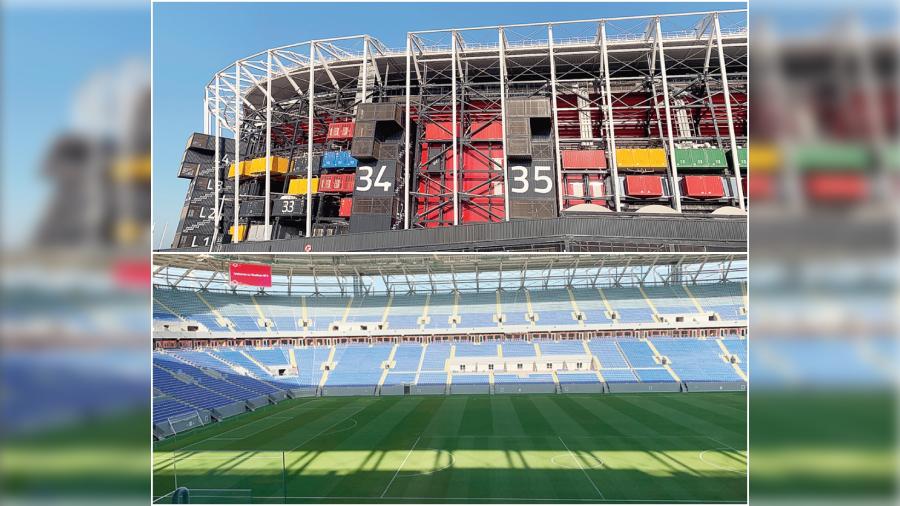There are many things interesting about Stadium 974 in Doha, Qatar, but that it is a part of a reimagined world of recycle and reuse is perhaps what makes it so special. Doha is buzzing right now with unmissable keywords floating from the quietest whispers and the loudest guffaws –– ‘football’, ‘World Cup’, ‘FIFA’.
The capital city’s sea drive houses a giant clock that is ticking towards FIFA World Cup 2022 that the country is set to host this year. The bid was won a little over a decade back but a two-year halt in building plans due to Covid-19 now has the country hastening towards the finish line. A week spent in Qatar proved that it isn’t too far away…
Stadium 974
Stadium 974 is made out of 974 shipping containers that were hand-picked and delivered from China. The containers join together to form the 40,000-capacity stadium that can be completely dismantled and donated to a country in need of state-of-the-art facilities. Creating the world’s first recyclable stadium — the abandoned and plundered Maracana stadium in Rio de Janeiro, Brazil, is on everyone’s mind –– it’s 2022 and wastage is no longer on the memo. The poetry of a former maritime nation paying homage to its legacy with shipping containers is also unmissable.
Designed by the internationally recognised architects Fenwick Iribarren, the stadium was used to host the first match of the FIFA Arab Cup between UAE and Syria in November 2019. The world as we know it shut down promptly afterwards, leaving the stadium awaiting the finishing touches. However, when The Telegraph walked in, it was ready in its impeccable best to welcome visitors from around the world in November.
Located on Ras Abu Aboud, it was initially named after the area. However, the name was later changed to a number which also happens to be the international dialling code of the country. Built on an artificial promontory, the delicious waterfront view with the glittering central business district visible on the horizon, the stadium affords the most glorious testament to Qatar’s five-decade journey since having reclaimed its independence from British rule. A walk through the VVIP area reserved solely for the likes of world presidents, diplomats and David Beckham (we asked!), transports you to a different world, one where you can hear the cacophony of the filled stands that Qatar will witness this year.
We were staying at Banyan Tree, Doha at La Cigale in Mushaireb area. A hotel with only suite options for stay, it came with its own theme park with one of the largest indoor roller coasters in the world. Entering through the driveway, one wouldn’t be able to guess the opulence that awaited you behind its swivelling doors.
Sitting down for a meal at the hotel’s Thai restaurant Saffron, one can see the entire skyline of the city glowing like embers with the sea by its side, deeply reminiscent of Mumbai. Qatar may have been a tad late in its discovery of oil but the country is keeping no stones unturned to catch up at the speed of light.
Dhow cruises
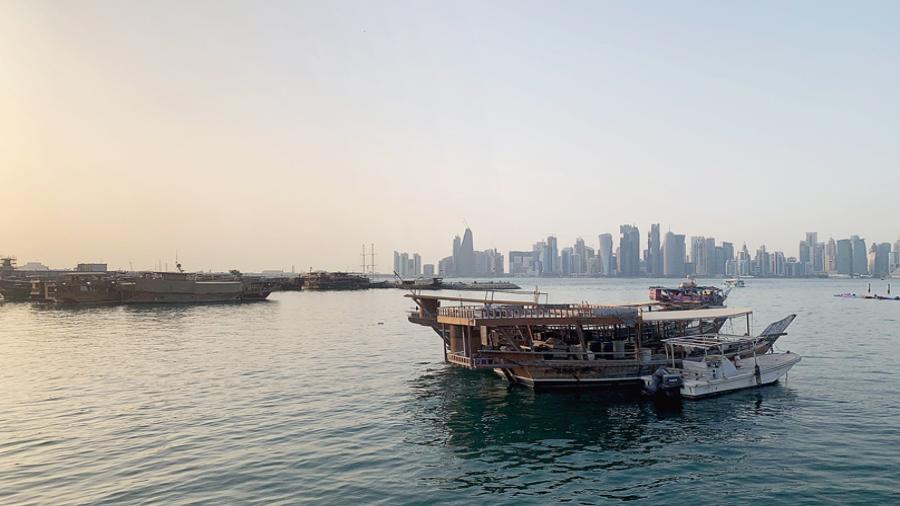
Dhows, once the vessels of choice of seafaring pearl hunters, now take tourists for cruises and have a tendency to play Bollywood numbers on board.
Daunting skyscrapers graze the skyline when viewed from the impeccably maintained dhows or ships that went from aiding seafaring pearl hunters to taking tourists on cruises now. For a cost as cheap at 2 Qatari Riyals (Rs 40 approx). There are other dhows that take you on a sail with most of them blasting popular Bollywood numbers, leading you to believe for a split second that you are back in India.
The Indian connect is unmissable in every portion of Qatar. Alia Bhatt was due in town for the opening of a jewellery convention in Doha and Berthold Trenkel, chief operating officer of Qatar Tourism, is actively looking at throwing some Bollywood light on the city to draw Indians’ attention towards them. “Not just an episode (referring to Karan Johar’s Netflix show The Fabulous Lives of Bollywood Wives, an episode of which was shot in Doha), I want him to shoot an entire feature film here, hopefully next year,” he says. And why not because Indians would love to experience the heady cultural mix Qatar has to offer.
The India connect, however, is not limited to Bollywood only. From the roofs of the old houses made from mangrove bamboos to the Kashmiri shawls that a persistent shopkeeper tries selling to me at a nearby souk, India is everywhere. Called the Souk Waqif, one knows this is where one needs to be on a tour to Doha as you see locals haggling for products in the bustling lanes.
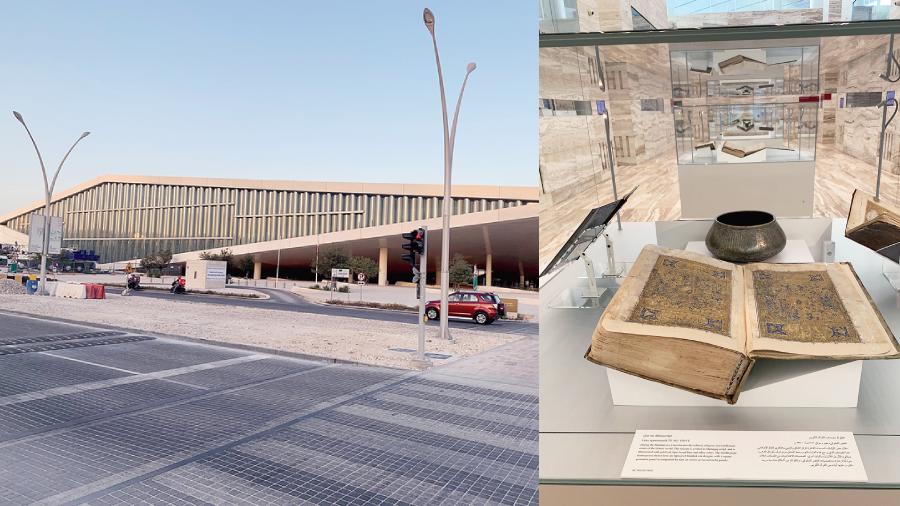
The National Library in Doha inside a swish modern building, houses, apart from its regular collection, antiquarian copies of the Quran (right)
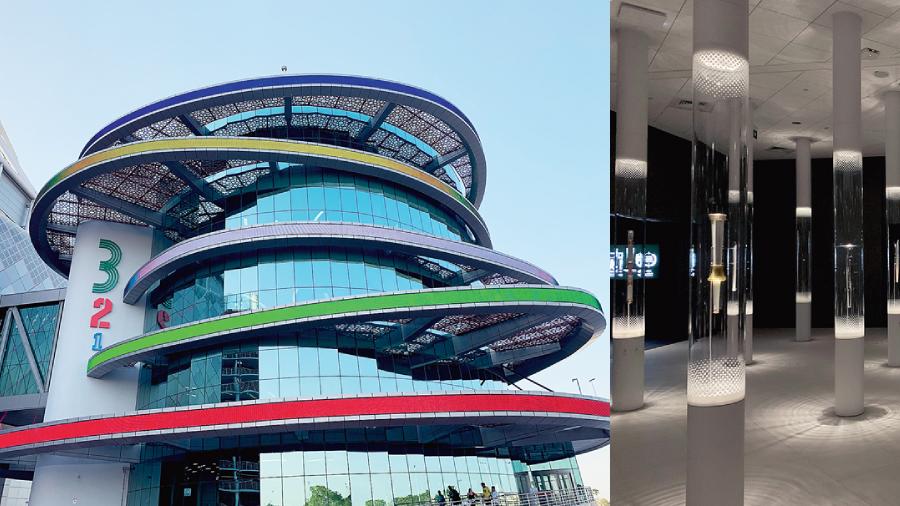
The 3-2-1 Olympic and Sports Museum has an interesting collection of Olympic torches
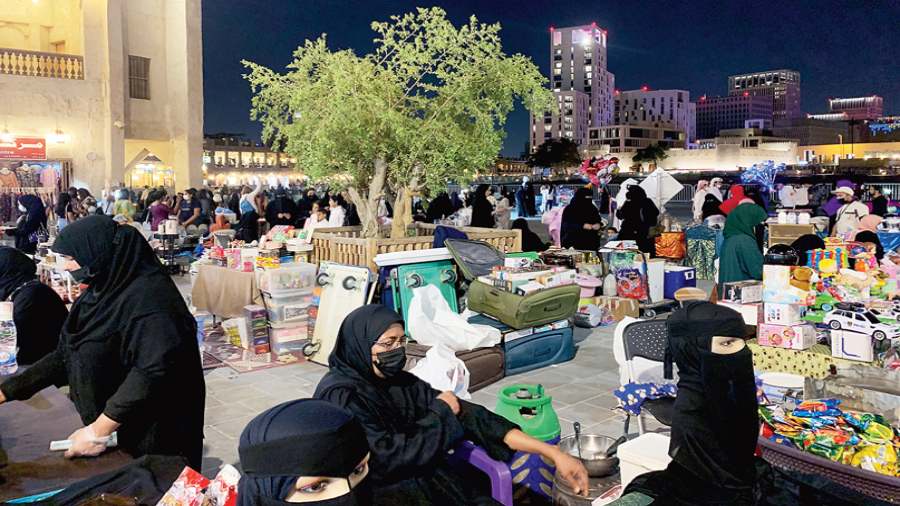
At Souk Waqif bargaining for merchandise is part of the charm
Meal times
Stopping for a meal at Damasca One restaurant, we are suddenly transported to a small town of Syria with authentic music, food, tea and company! The communal style of eating comes alive in Qatar as each dish is served in large portions, meant to be shared on each table. The hummus and khubuz, the traditional and delicious spinach kibbeh, plates of chicken rice and grilled meat straddle the table, making overeating the norm.
However, whether you are at Damasca One or the more rustic Turkey Central or the really upscale Jiwan fine-dining restaurant at Qatar National museum, food is communal and digging your fingers in is unavoidable! Turkey Central, one of the oldest BBQ establishments on the bustling Al Nasr street, is always filled with people and the tantalising smell of their famous kebabs and kofte on tomato bread accompanied the cold starters (mezze).
Falcon Hospital
There is a falcon hospital housed in one corner of Souk Waqif and our guide for the day turned out to be a New Yorker who has been living in Qatar and has been obsessed about the gorgeous bird for two decades. Surrounded by falcon shops all around, we walked into a giant perched on a metal frame digging into a bony piece of raw meat, a helmet-esque headgear covering both their eyes.
“The owner opens the helmet to make eye contact with the bird and establish a relationship while serving him food. Once that is achieved, the training of the falcon begins to race and win money, cars and mostly pride for their owners,” we were told by a shopkeeper selling everything required to home and race a falcon, as well as the mighty birds themselves. Treated as family, the falcon hospital anecdotally has dedicated storage space for various kinds of feathers to facilitate feather transplant surgeries. The hospital even had tiny falcon footmarks leading inside to welcome the birds! What’s not to adore?
Mushaireb museums
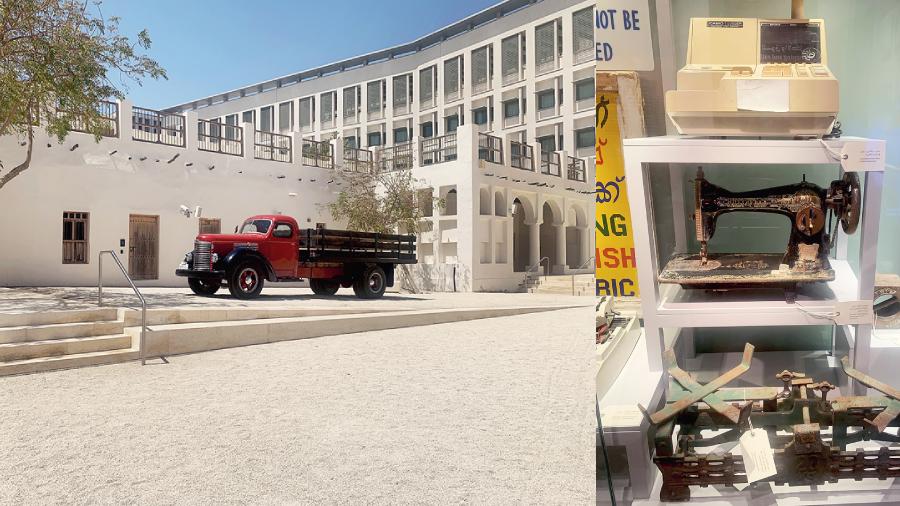
Mushaireb Museums are the perfect testament to Qatar’s history meeting technological advancements
Taking the freshly constructed metro to downtown Mushaireb, we ran into an education fair that had halted the in-line tram service through the area. Qatar is home to world-class universities including Cornell University’s Weill Cornell Medical College in Qatar, Georgetown University’s School of Foreign Service, Northwestern University’s Medill School of Journalism, the Carnegie Mellon University in Qatar, Virginia Commonwealth University in Qatar (School of the Arts) and Texas A&M University at Qatar and the education city is testament to the Emir’s inclination to developing a robust future generation in the country.
The impeccably clean downtown area also has four houses that were former homes of Emirs: The Bin Jelmood House, The Company House, the Mohammed Bin Jassim House and the Radian House that are home to an immersive homage to Qatar’s history, one that is both young and vibrant. There are old Pepsi bottles and boxy television sets that form a part of Qatar’s historical account, a fact that appears to be slightly unsettling when one hails from a country with rich history spanning centuries.
The Company House has Shell, the UK-based oil company, as its patron and recounts the tale of Qatar finding oil and the journey of transformation thereon, told through a moving film that plays at the museum at regular intervals.
3-2-1 Olympics and Sports Museum
Immersive experiences mixing technology with artistry form the crux of most important sites worth visiting. One of many such institutions now include the 3-2-1 Olympics and Sports Museum that opened doors on March 30, the day we arrived there for a tour. Taking one through the history of sports around the world, one can play games and interact with screens, making it a fascinating journey of exploration for little ones.
The museum also impressively is home to the Olympic torches, only the second of the two museums in the world to have such a display. We were being shown around by our guide Pia Sunstedt, a Finnish woman who competed in the Olympics herself in cycling. The poetry of the moment was not lost on us when she pointed at the 2000 torch, the one in its lit form, she had stood next to at some point of time in her life!
Qatar National Library
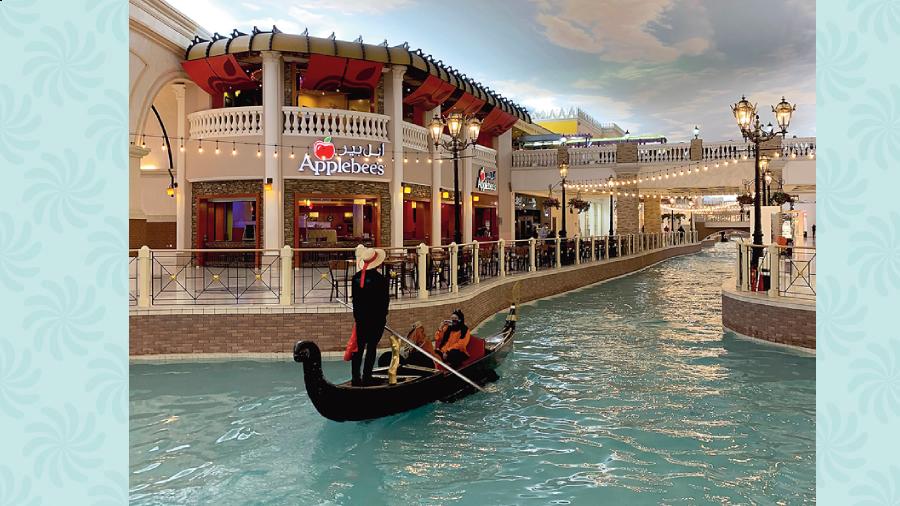
The Villagio Mall tries to replicate the Venetian experience and even has an artificial sky to complete the ambience
A trip through this knowledge land of sports was perfectly complemented with a visit to the gigantic Qatar National Library –– a treat for the body and a treat for the mind. The National Library is a gorgeously maintained treasure trove of one of the largest variety of books in the world. The 45,000sq m building with state-of-the-art technology for automated self-checkout and return station, it is layered with storage cleanly dividing the historical accounts from the present. Designed by world-renowned architect Rem Koolhaas, it is community spaces like these that birth ideas for the future.
Seaside Activities
The future meeting the past in perfect homage is visible in every line of architecture and every corner of the country. Just like the inland sea meeting the desert shore near Doha. Go dune bashing with certified drivers like we did and spend the afternoon at a beachside club-like Sea Line Beach Resort. For a moment, get transported to the azure waters of the Maldives on the beachfront, still and gorgeously blue.
The importance of the sea in Qatar’s tourism strategy is quite unmissable. The Pearl Island, for instance, is one of the largest residential projects open to visitors for a luxurious day of water sports and great food. Why just take a dip in the sea when you can also kayak or waterboard around highrises?
Shopping
We refrained from shopping this time and came back with immense regret! For options were plenty for indulgence! The Villagio Mall, made to resemble the streets of Venice complete with a waterbody with ferrying boats for leisure, even had a faux sky. Housing an indoor ice skating rink, we learnt about the national Qatar ice hockey team and their impressive growth in recent years. Watching people of all ages practise on ice, we couldn’t help but appreciate the culture of sports that the country is focusing on, hosting world events and building a robust system of opportunities from within.
Arts, education, sports and development are wholly on Qatar’s mind right now and that is evident from every bustling corner of the burgeoning city of Doha. Lusail, a smart township coming up on the suburbs of Doha, is a testament to this growth as we hear of expats and Qataris rushing to buy property there.
Katara Cultural Village
On the way to Lusail, we walked into Katara Cultural Village, a space for performance art with a luxury mall to boot. A group of 21 journalists from four countries stood around in a circle in the amphitheatre there, stomping our feet and clapping our hands in sync, listening to the sound reverberating back to us. We giddily laughed clapping for an encore performance, momentarily claiming the stage as ours. Just as Qatar is… claiming its space slowly and steadily on the global stage.

